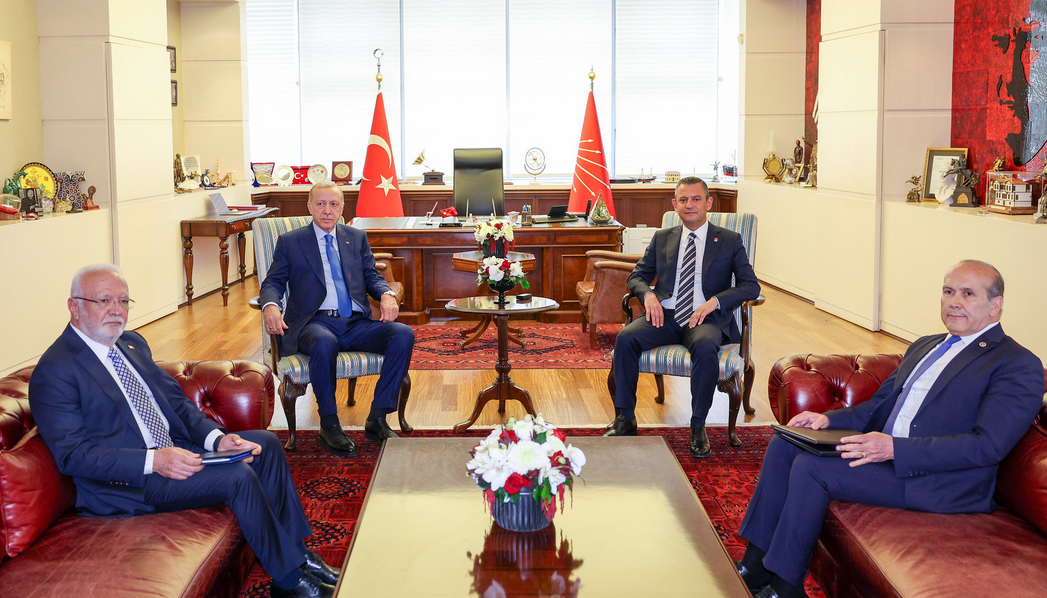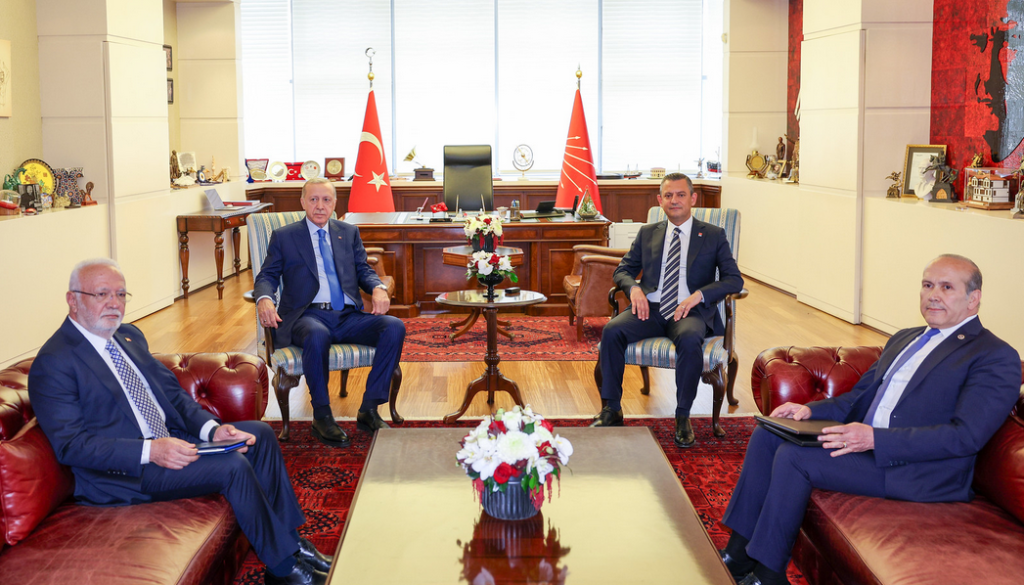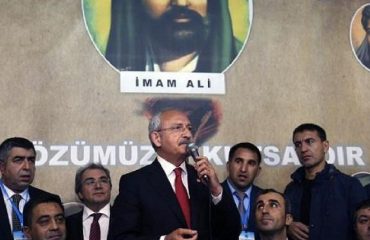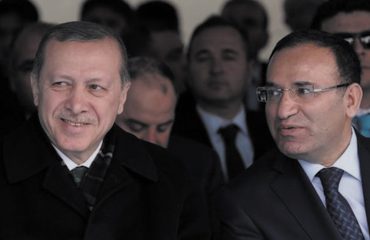

President Tayyip Erdoğan’s recent visit to the CHP Headquarters for a second meeting with CHP leader Özgür Özel marked a continuation of their dialogue, with both leaders agreeing to meet again in Nicosia on July 20. This ongoing conversation occurs amidst fierce criticism from MHP leader Devlet Bahçeli, who issued a stark warning to Erdoğan regarding the handling of the Sinan Ateş murder investigation. (Photo: CHP)
One of the main questions seeking an answer in President Tayyip Erdoğan’s second meeting with Republican People’s Party (CHP) leader Özgür Özel at the CHP Headquarters on June 11 was “is it over or will it continue?” amid Erdoğan’s alliance partner Nationalist Movement Party (MHP) leader’s fierce criticism towards the “normalization” of fiercely polarized Turkish politics.
After a 1.5-hour meeting, this question was answered: the two leaders decided to continue the dialogue. Meanwhile, the place and time of the third meeting were also determined: on July 20 in Nicosia. It was in a key moment marking the first such occurrence in 18 years as President Tayyip Erdoğan visited the CHP Headquarters for a meeting with Özel.
July 20, 2024, marks the 50th anniversary of the Turkish Armed Forces’ Cyprus Peace Operation. President Erdoğan brought up the topic during the meeting. He stated that they plan to go with a large delegation to show Turkey’s support for the Turkish Republic of Northern Cyprus on the 50th anniversary and that they would like to see the CHP there as well. Özel responded that they already had plans for the 50th anniversary in Northern Cyprus and accepted.
In 1974, after the coup in the Republic of Cyprus backed by the junta in Greece targeted Turks, the Turkish government decided to intervene militarily. The Prime Minister at the time was CHP leader Bülent Ecevit, and the coalition partner Deputy Prime Minister was MSP leader Necmettin Erbakan.
While the details are not clear, the third Erdoğan-Özel meeting will take place in Nicosia, alongside events in the TRNC.
Topics of the second meeting
It seems that Özel did most of the talking. He focused mainly on economic conditions, the cost of living, people’s livelihood difficulties, the minimum wage, and retirees. Additionally, the issue of trustee appointments, as in the case of Hakkâri Municipality, was brought up; Erdoğan did not indicate any change in stance on this matter. The topic on which Özel did not signal a change in stance was Erdoğan’s request for support for constitutional amendments, which was almost the only topic he focused on; the CHP insists that they will not start discussing a new constitution without adhering to the existing one, especially Constitutional Court decisions.
On the other hand, the developments following the meeting at the AKP Headquarters on May 2, were also evaluated. Özel expressed satisfaction with seeing tangible results of normalization, such as Erdoğan’s meeting with Ayşe Ateş, the widow of political murder victim Sinan Ateş, a former Nationalist Grey Wolfs leader, and the release of 28 February convict generals due to health conditions, which were among Özel’s proposals in the first meeting on May 2.
He also mentioned that they expect developments in the Gezi Park trial. Erdoğan stated that he appreciated the CHP’s stance on foreign policy, especially regarding Gaza, and expected the CHP’s statements and attitudes on international platforms to continue in this direction.
This is a product of the voters
First of all, it should be said that the circumstances bringing President Erdoğan to the CHP for a discussion on equal footing as the AKP leader is a product of the voters in the March 31 local elections.
It is difficult to predict now whether the third meeting in Nicosia will be as comprehensive as the first two, but at least an assessment of the situation can be expected.
Meanwhile, it is known that Özel has announced two rallies focused on economic issues. There will be a workers’ rally in the industrial region of İzmit, where the demand for an increase in the minimum wage (and consequently pensions) will be raised, and a farmers’ rally in Tekirdağ focused on wheat prices. In response to Özel’s demands on these issues, Erdoğan suggested that they could also speak with the Minister of Treasury and Finance Mehmet Şimşek.
Following the first meeting, face-to-face meetings were arranged between the CHP’s deputy chairmen, declared as “shadow cabinet members,” and the Ministers of Foreign Affairs, National Defense, Interior, and Environment and Urbanization at the CHP’s request.
Bahçeli issued a “memorandum”
Erdoğan continues to insist on constitutional amendments, but the only obstacle is not the CHP’s insistence on “first adhering to the current Constitution.” There is no public demand for such changes, but issues like the presidential system, which the CHP opposes, and the 50+1 requirement are red lines for Erdoğan’s coalition partner, MHP leader Devlet Bahçeli.
Recently, another issue has arisen between the two parties: the fact that the voice of Ayşe Ateş, Sinan Ateş’s widow, first supported by the CHP, is now being heard at every level, including the President. Bahçeli is not hiding his reaction to this.
After Ayşe Ateş’s visit to Özel on June 10, it was announced that Erdoğan had accepted a request for a meeting, which took place promptly on June 11. Bahçeli had previously reacted by instructing MHP delegates not to vote in the Turkish Municipalities Association elections, exposing the issue within the AKP. Bahçeli posted showing a hand holding a file with a ring that reads “God is enough for me,” it was a sign of a new move.
It would be unexpected if Bahçeli stayed silent, but noone expected him, known for his tactical maneuvering and his mastery of criticism and threats, would go so far as to issue an open letter to Erdoğan through the media, akin to a memorandum.
In the written statement released on MHP’s Media General Vice President İsmail Özdemir’s “X” account, Bahçeli suggested that if the AKP intended to form a “broad-based” alliance with CHP, MHP could step aside.
The Sinan Ateş Issue
At the end of Bahçeli’s memorandum-like statement, he reiterated his support for the President and the People’s Alliance, effectively saying, “I’m not leaving, you are.” The root of Bahçeli’s complaint, as he explicitly states, is the ongoing investigation into the murder of former Ülkü Ocakları President Sinan Ateş. Bahçeli desires the case to conclude in line with the indictment, which, despite police findings, does not implicate any individuals from MHP or Ülkü Ocakları.
If MHP members are found to be connected to the murder, it could shift the political balance, potentially leading to a party closure case. Bahçeli stated, “The constant glorification of certain names, and parading them around, is a full-fledged attempt to poison the atmosphere of peace and tranquility.” This targets Ayşe Ateş, who has shown exceptional perseverance in seeking justice for her husband’s murder.
Bahçeli is openly telling Erdoğan that if he does not want to break the People’s Alliance, he should not pursue the Sinan Ateş murder case further. Moreover, Bahçeli places the trial’s first hearing on July 1 at the center of this tension, hinting at a confrontation in the courtroom.
Bahçeli: “Either Özel or Me”
The memorandum also serves as a “reminder.” Bahçeli reminds Erdoğan that he was elected President twice thanks to Bahçeli’s support, that they amended the Constitution together, and that he is now ready to amend it again (if their parliamentary seats suffice), provided the Sinan Ateş murder case is not pursued further due to fears of MHP-related names being implicated. Bahçeli also mentions a “new, complex equation” being established through “normalization and easing,” terms used by Özel and Erdoğan respectively, and expresses concern that MHP might be excluded from this equation. Among those Bahçeli accuses are individuals within the AK Party trying to stir up trouble, further complicating his memorandum-like stance.
Erdoğan’s response to Bahçeli’s “Either Özel or me” ultimatum and its aftermath is likely to further heat up the political atmosphere this summer.


